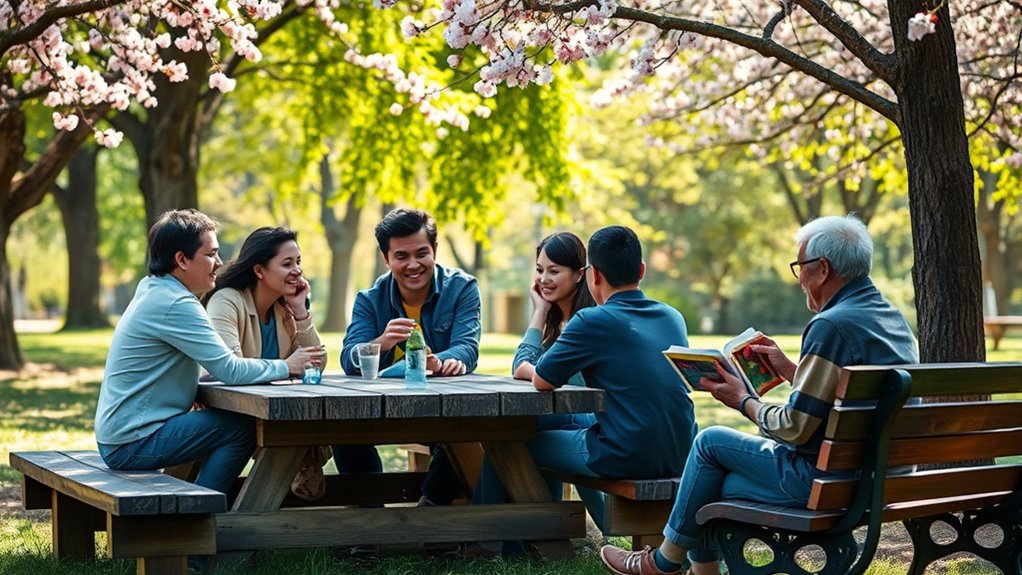To combat loneliness, focus on building your social skills and expanding your support networks. Practice engaging in conversations, listening actively, and joining community groups, clubs, or volunteer activities that match your interests. Use technology like social media or online support groups to stay connected. Incorporate daily self-care routines or creative outlets to boost resilience. Each step helps you foster meaningful connections, and exploring these strategies further can open up new opportunities to feel more connected.
Key Takeaways
- Practice social skills and active listening to build confidence and foster meaningful relationships.
- Expand support networks by reaching out to friends, family, and joining community groups or activities.
- Participate in community volunteering or group therapy to create shared experiences and a sense of belonging.
- Use digital platforms like social media, online forums, and mental health apps to maintain and strengthen connections.
- Engage in daily self-care routines, creative pursuits, and social activities to boost emotional resilience and reduce loneliness.

Are you looking for effective ways to cope with loneliness? You’re not alone in feeling isolated at times, but there are practical strategies you can adopt to build connections and improve your emotional well-being. One of the most impactful approaches involves developing your social skills. By actively practicing and enhancing how you interact with others, you’ll find it easier to forge meaningful relationships, which helps reduce feelings of loneliness. Participating in social skills training can give you the confidence you need to start conversations, listen effectively, and navigate social situations more comfortably.
Develop your social skills to build meaningful relationships and reduce loneliness.
Strengthening your social support network is another powerful tool. Reach out to friends, family, or community groups to expand your support system. Building these connections provides a safety net during challenging times and offers opportunities for companionship. Engaging in group activities is especially effective, as it puts you in situations where you can meet new people and develop bonds through shared interests. Whether it’s joining a club, attending a class, or participating in local events, these activities create natural avenues for social interaction.
Community initiatives further support your efforts to combat loneliness. Local programs like mentorship, befriending schemes, or volunteer work not only help others but also enable you to connect with like-minded individuals. Volunteering, in particular, gives you a sense of purpose while offering opportunities to meet new people, fostering a sense of belonging. Additionally, group therapy sessions provide a safe space to share experiences and learn from others facing similar challenges, which can diminish feelings of isolation.
Technology also plays a significant role in modern social strategies. Social media platforms, despite sometimes intensifying loneliness, can be used positively to maintain connections and find virtual communities that share your interests. Online forums and support groups offer accessible ways to stay connected, especially if mobility or location is an issue. Digital interventions, like online therapy or mental health apps, can provide tailored support, including cognitive behavioral therapy (CBT), to help reframe negative thoughts that contribute to loneliness. Research shows that digital tools can be effective adjuncts in reducing feelings of loneliness and improving well-being. Incorporating safe online spaces can further enhance your ability to find support and community.
In your daily life, simple coping mechanisms can make a big difference. Creative outlets like art or music can help you process emotions, while regular self-care routines boost resilience. Participating in spiritual or religious practices can foster a sense of community and comfort. Sharing meals or engaging in physical activities not only lift your mood but also open doors for social interaction. These small, consistent efforts build your emotional strength and create more opportunities for meaningful connections.
Frequently Asked Questions
How Can I Identify Loneliness Before It Worsens?
You can spot loneliness early by noticing signs like feeling disconnected even in crowds, avoiding social situations, or feeling exhausted when trying to engage with others. Pay attention to persistent negative thoughts about yourself, mood swings, or changes in sleep and energy levels. Regularly check in with your emotions and behavior—if you notice these patterns, it’s a good idea to seek support or create opportunities for meaningful connections before things get worse.
What Are Some Signs Loneliness Is Affecting My Health?
Loneliness can be a silent storm that wrecks your health. You might notice persistent fatigue, headaches, or nausea, even when you’re not sick. Elevated stress hormones can cause high blood pressure, weight gain, and trouble concentrating. You may also experience sleep problems, mood changes, or social withdrawal. These signs signal loneliness is taking a toll, so paying attention now can help you take steps to protect your well-being.
Can Pets Help Reduce Feelings of Loneliness?
Pets can definitely help reduce your feelings of loneliness. They provide emotional companionship, physical contact, and a sense of purpose, which can boost your mood and social connection. Spending time with your pet, especially during tough times, can make you feel less isolated and more cared for. Just remember, while pets are great allies, maintaining human relationships is essential for your overall well-being.
How Do Cultural Differences Influence Loneliness Coping Strategies?
Cultural differences shape how you cope with loneliness by emphasizing community, traditions, and spiritual practices. In Southeast Asian cultures, you might rely on family, community rituals, or religious gatherings to find comfort. In Western cultures, you could turn to technology, hobbies, or social clubs. Embracing these unique approaches helps you build social connections, find support, and maintain a sense of belonging, regardless of cultural background.
Are There Online Communities That Effectively Combat Loneliness?
Yes, some online communities can effectively combat loneliness. You find value in supportive forums and group sessions on digital mental health platforms, which provide social interaction and a sense of belonging. Engaging with these communities helps you stay connected, especially if in-person meetings aren’t possible. However, their effectiveness depends on the quality of interactions and content. Combining online community participation with offline activities boosts your social bonds and reduces loneliness.
Conclusion
You have the power to transform loneliness into connection. By reaching out, joining groups, or simply sharing a smile, you can create a ripple effect that changes your world. Remember, your efforts could be the spark that ignites a community of support, proving that even in the darkest moments, you hold the key to brighter days. Don’t underestimate your ability—your courage can tame loneliness like a hero conquering an unstoppable force.










